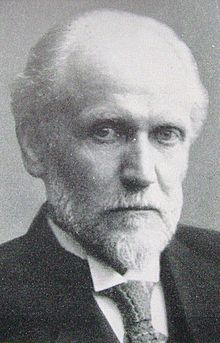Gustav Cassel | |
|---|---|
 | |
| Born | 20 October 1866 |
| Died | 14 January 1945 (aged 78) |
| Nationality | Swedish |
| Academic career | |
| Field | Mathematical economics |
| Institution | Stockholm University |
| School or tradition | Stockholm School |
| Alma mater | Uppsala University |
| Doctoral advisor | Gösta Mittag-Leffler |
| Doctoral students | Gunnar Myrdal Bertil Ohlin Eli Heckscher Gösta Bagge |
| Influences | Léon Walras |
| Contributions | Purchasing power parity, work on interest |
Karl Gustav Cassel (20 October 1866 – 14 January 1945) was a Swedish economist and professor of economics at Stockholm University. Cassel was among the most prominent economists in the world in the interwar period.[1] He made contributions to the study of value, monetary policy, and business cycles.[2]
Cassel was influential in Swedish debates about central planning in the early 20th century.[1] Prior to World War I, Cassel held classical liberal views but shifted towards conservative liberalism in the interwar period.[1] Cassel was a leading critic of socialism[2] and state intervention in the economy.[3]
- ^ a b c Carlson, Benny (2018). Swedish Economists in the 1930s Debate on Economic Planning. Springer. pp. 33–35. doi:10.1007/978-3-030-03700-0. ISBN 978-3-030-03699-7.
- ^ a b Ellis, Howard S. (1945). "Gustav Cassel 1866-1945". The American Economic Review. 35 (3): 508–510. ISSN 0002-8282.
- ^ Carlson, Benny; Jonung, Lars (2024), Tooze, Adam; Corsetti, Giancarlo; Obstfeld, Maurice; Clavin, Patricia (eds.), ""Too Bad to Be True": Swedish Economists on Keynes's The Economic Consequences of the Peace and German Reparations, 1919–29", Keynes's Economic Consequences of the Peace after 100 Years: Polemics and Policy, Cambridge University Press, pp. 99–129, doi:10.1017/9781009407540.006, ISBN 978-1-009-40755-7